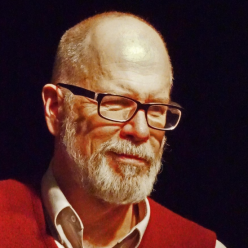My friend Dion Flynn recently taught Mopco a master class on “The Tao of Improv.” At the start of the class, Dion gave us a $40,000 nugget. Dion is a gradate of NYU, with a BFA in theatre. He told us that throughout his training, which he figures cost him about $40.000, his teachers repeatedly tried to get one simple concept across. Once he got it, Dion said, he realized that is was THE most important concept he was given throughout his education. And then he gave it to us, free.
So I shall now pass on this pricy concept. Ready?
Relax your shoulders and breathe.
That’s it.
Dion shared that, and I flashed back many years, to being a freshman acting student playing theatre games in George Morrison’s class, listening to him admonish us to “get in touch with your breathing…be here now.”
New improvisers (actually many new actors, scripted or not) tend to think they must be DOING something, every second, on stage. So they create “characters”, by twisting their bodies, faces, and voices into awkward postures, and they create “reactions”, mimetic rituals that serve to prevent them from actually reacting to the environment. They create “business”, which is often intended to be funny, and isn’t. They feverishly dream up “clever” things to say, ignoring the natural, obvious replies that spring unaided into their heads.
As a result, they create stiff, stilted, semi-people, who are as awkward as they are boring. (I know. Harsh. But true.)
To stop doing this, and start just BEING, is a big, and critical, hurdle.
We are human beings, not human doings.
Viola Spolin, in her seminal book Improvisation for the Theatre, prescribed that we should show someone listening by…that’s right: listening. Not by cupping our hand to our ear, or bending forward at the waist while squinting our eyes. These are things people may naturally do as they try to listen—but they aren’t “listening.” Shakespeare spoke to the issue: “…but if you mouth it, as many of your players do,
I had as lief the town-crier spoke my lines.
Nor do not saw the air too much with your hand, thus,
but use all gently…” Hamlet, Act III sc ii
To be interesting on stage, be interested. Do less, be more, and; (all together now:) Relax your shoulders, and breathe.
A short time ago I saw this beautifully illustrated in a scripted play. Gorman Ruggiero, a friend from way back, mounted a production of Of Mice and Men using professional actors and local, amateur actors. It was an impressive production; the local amateurs performed handsomely. Yet for the most part, it was easy to pick out the amateurs, because they did the most. They posed, scratched, mugged; they had “character” voices. These performances were very effective—the actors in question portrayed the characters they were playing in a way that we the audience understood…if we really willingly suspended our disbelief. But they were clearly amateur performances. However, one of these amateurs, who happened to be my friend’s son, was different. As it happened, he was playing Lennie.
Many years ago I saw Of Mice and Men on Broadway, with James Earl Jones playing Lennie. I couldn’t stand Jones’ portrayal. Didn’t believe it. Probably because he was DOING so much to make us believe that he, James Earl Jones, an actor with natural dignity and high status, could be this simple-minded farm worker.
Thirty-odd years later, Brynn-Wolf Ruggiero, this young, untrained actor, was totally believable. I assumed, since he was Gorman’s son, that he had followed in his dad’s footsteps, and was professionally trained. After the show I learned that this was not the case. He is not an actor. Yet he was the best Lennie I have ever seen. Why, I wondered? I came up with a few answers. First, he didn’t do a cartoonish Lenny voice. He spoke, simply, when he had something to say. Next, he didn’t do much! He listened, when he was listening. When he pet a mouse, he pet the mouse. He didn’t “show” us Lennie’s love for soft things. He just pet the mouse.
I’ve never seen a Lenny do less. Never believed one more.
So, improvisers and script actors alike: When you don’t know what to do:
Relax your shoulders. Breathe. Allow your real reaction to happen. It not only isn’t “stupid” (as our censor likes to tell us, whispering away up there in our head) it is probably fascinating. To relax your shoulders and breathe is to say that you are here, now, and receiving. That’s always fascinating to watch.
